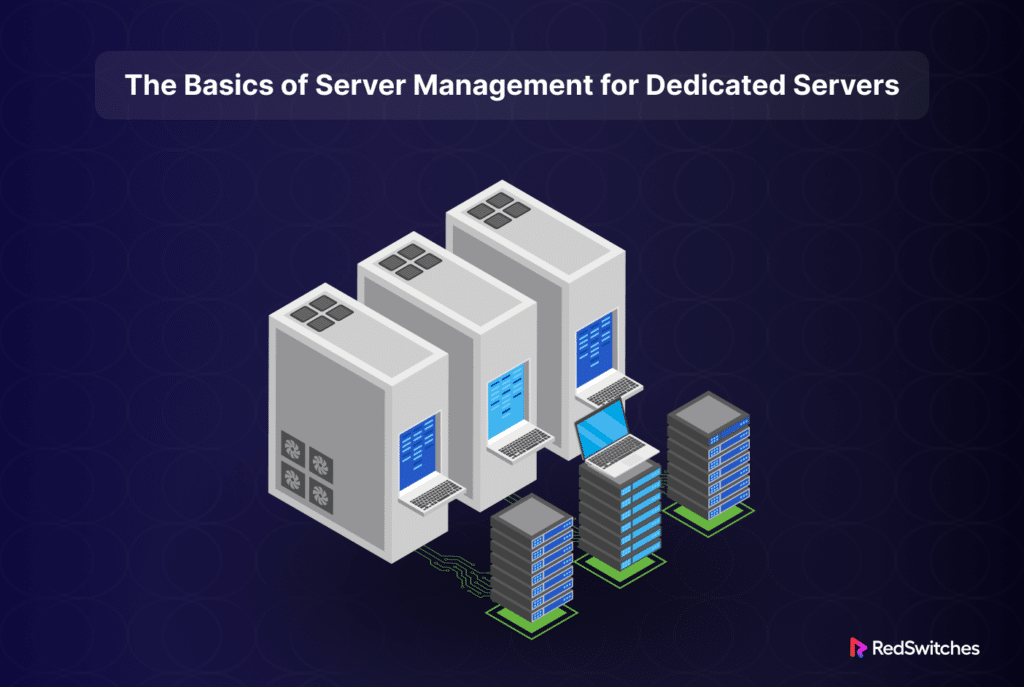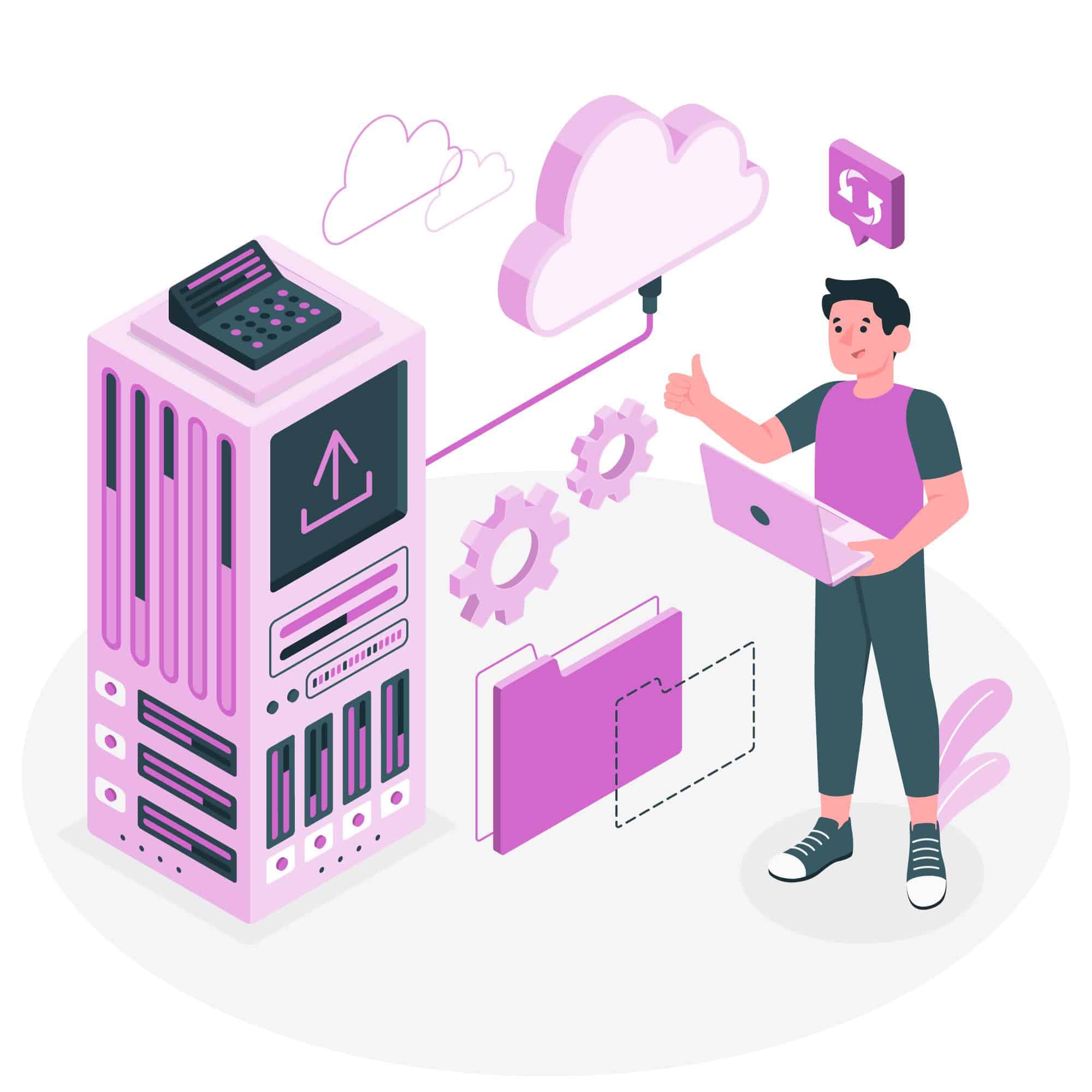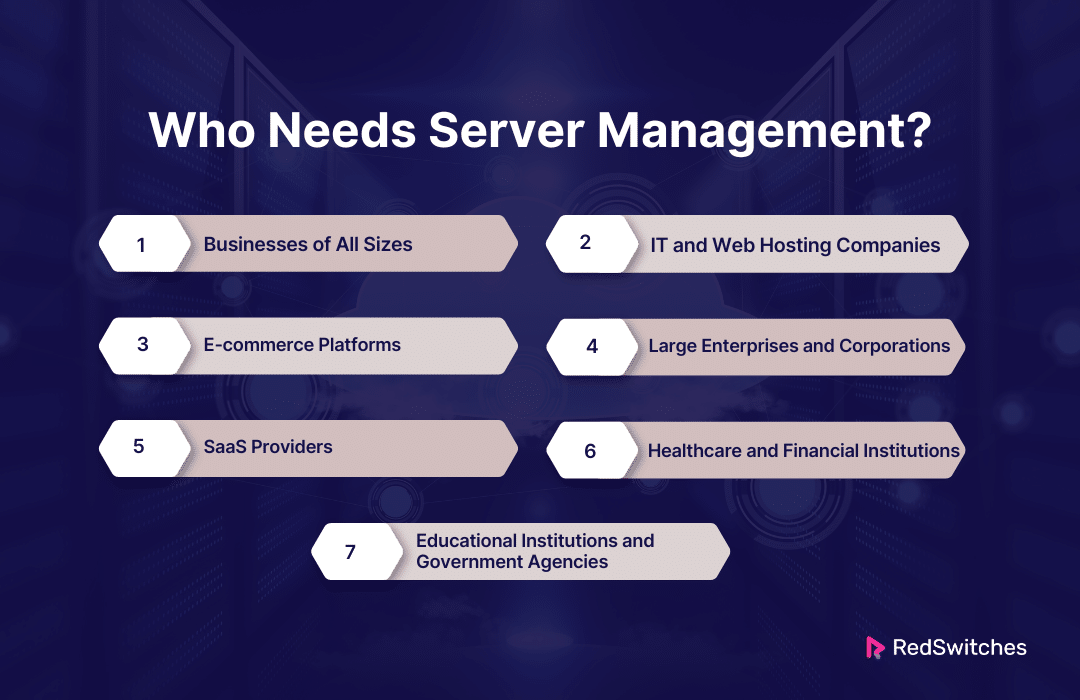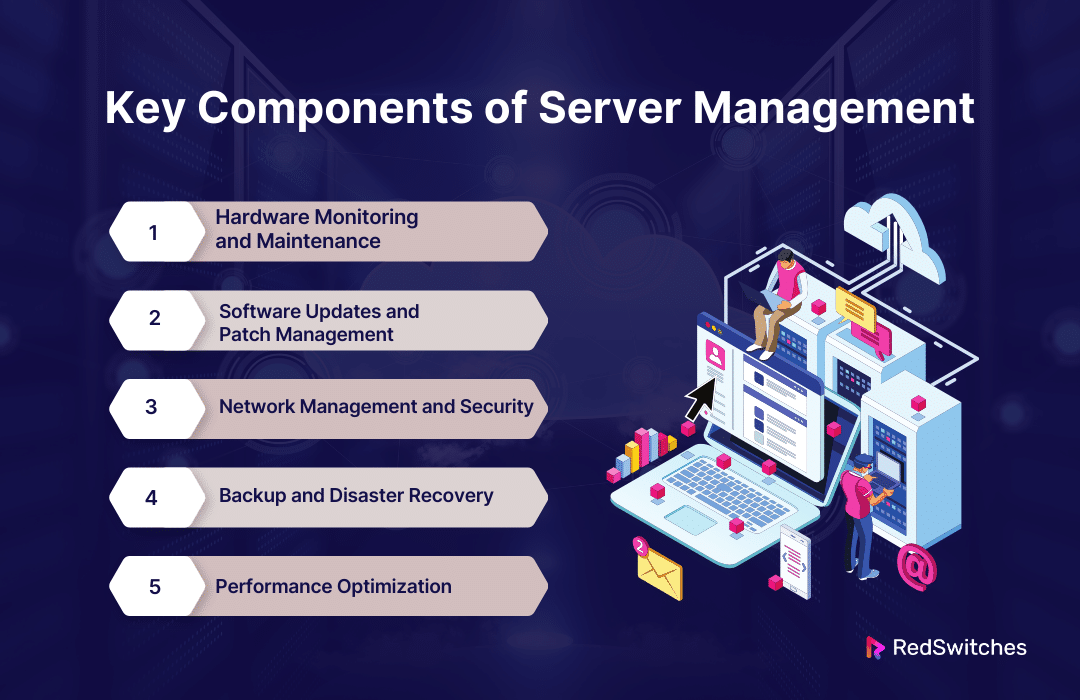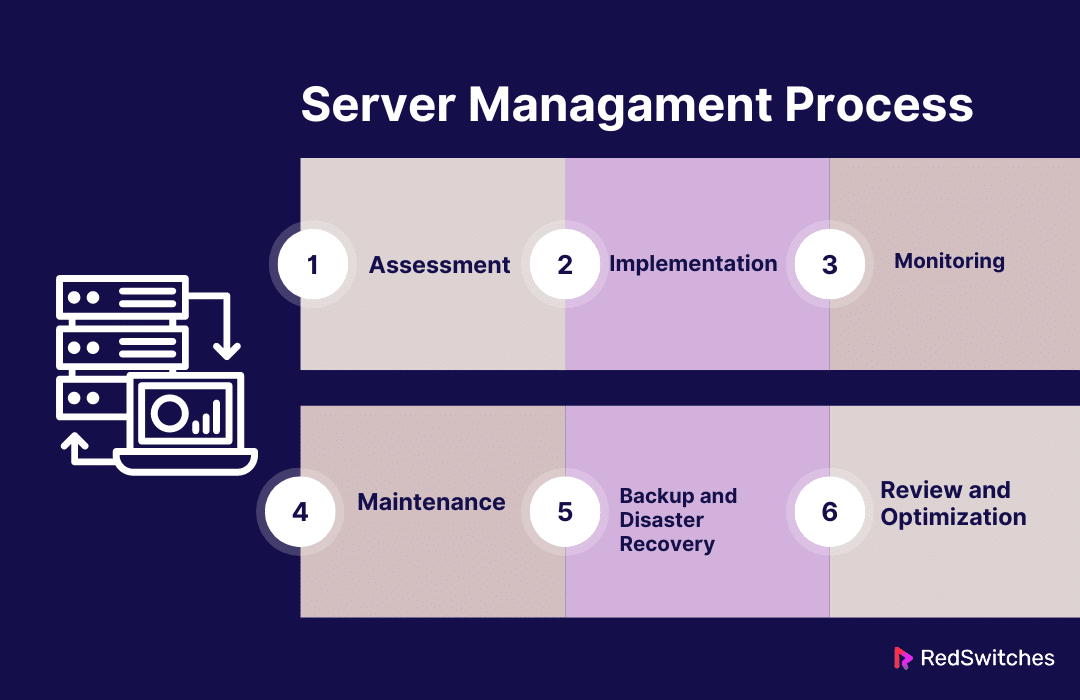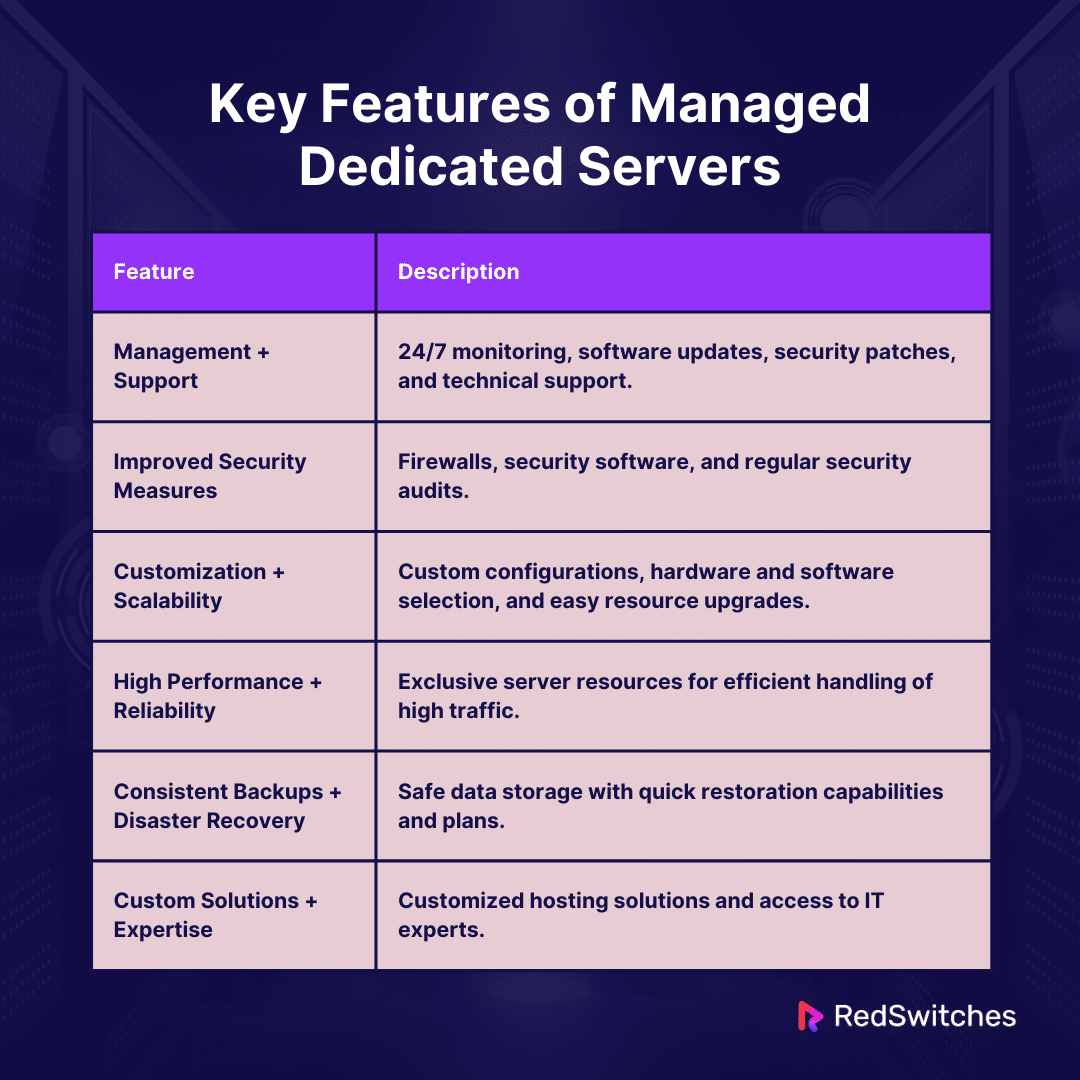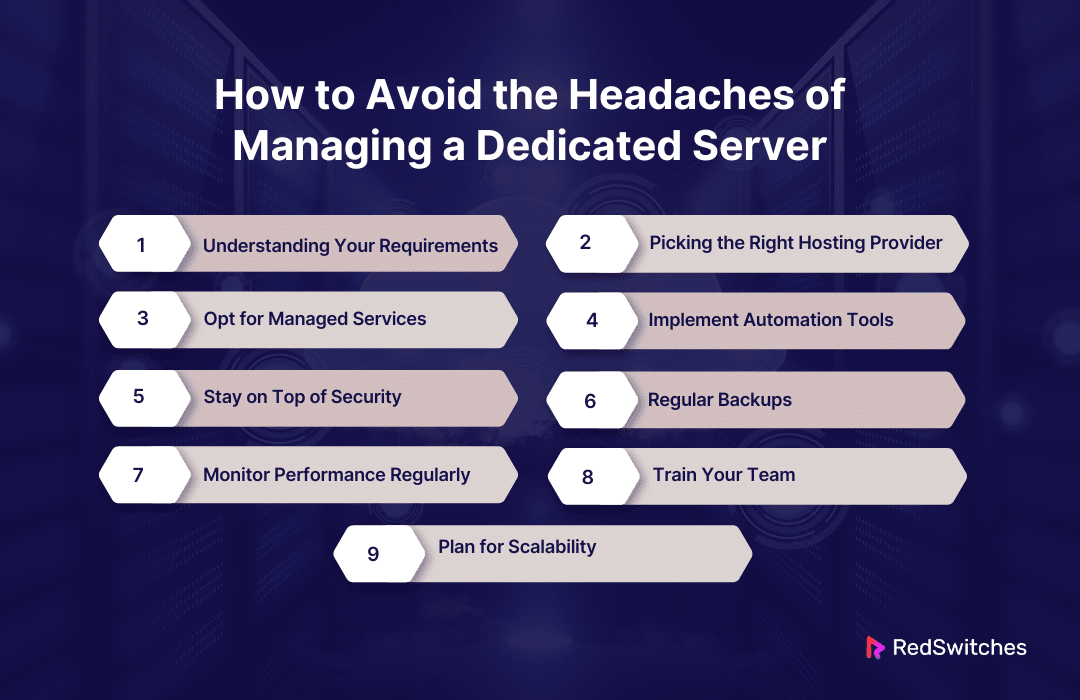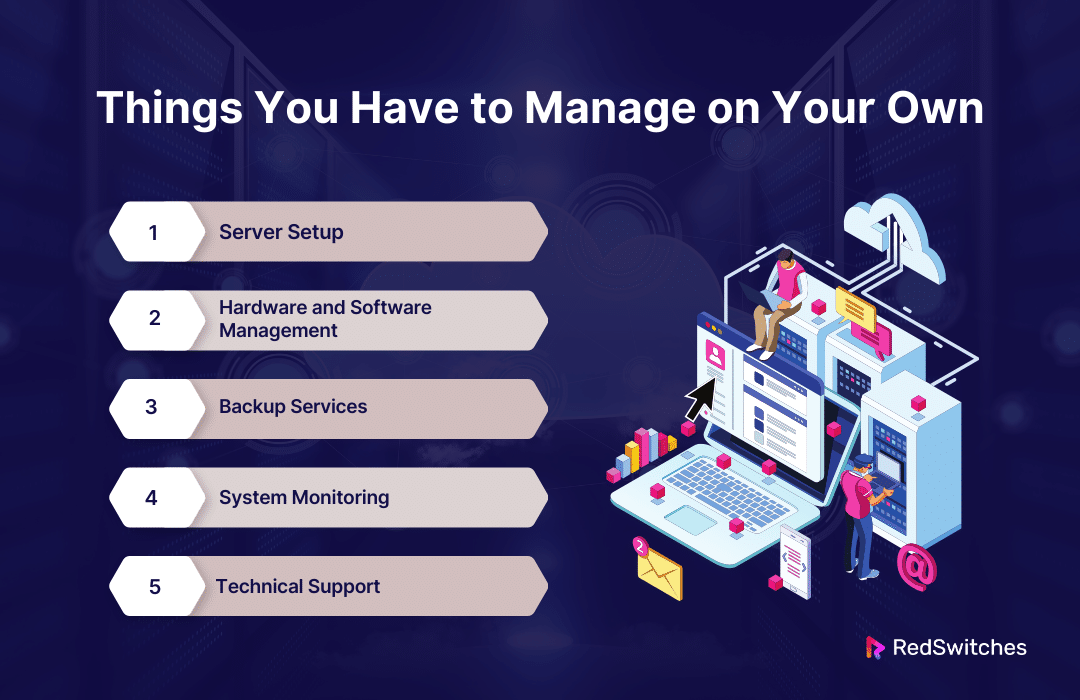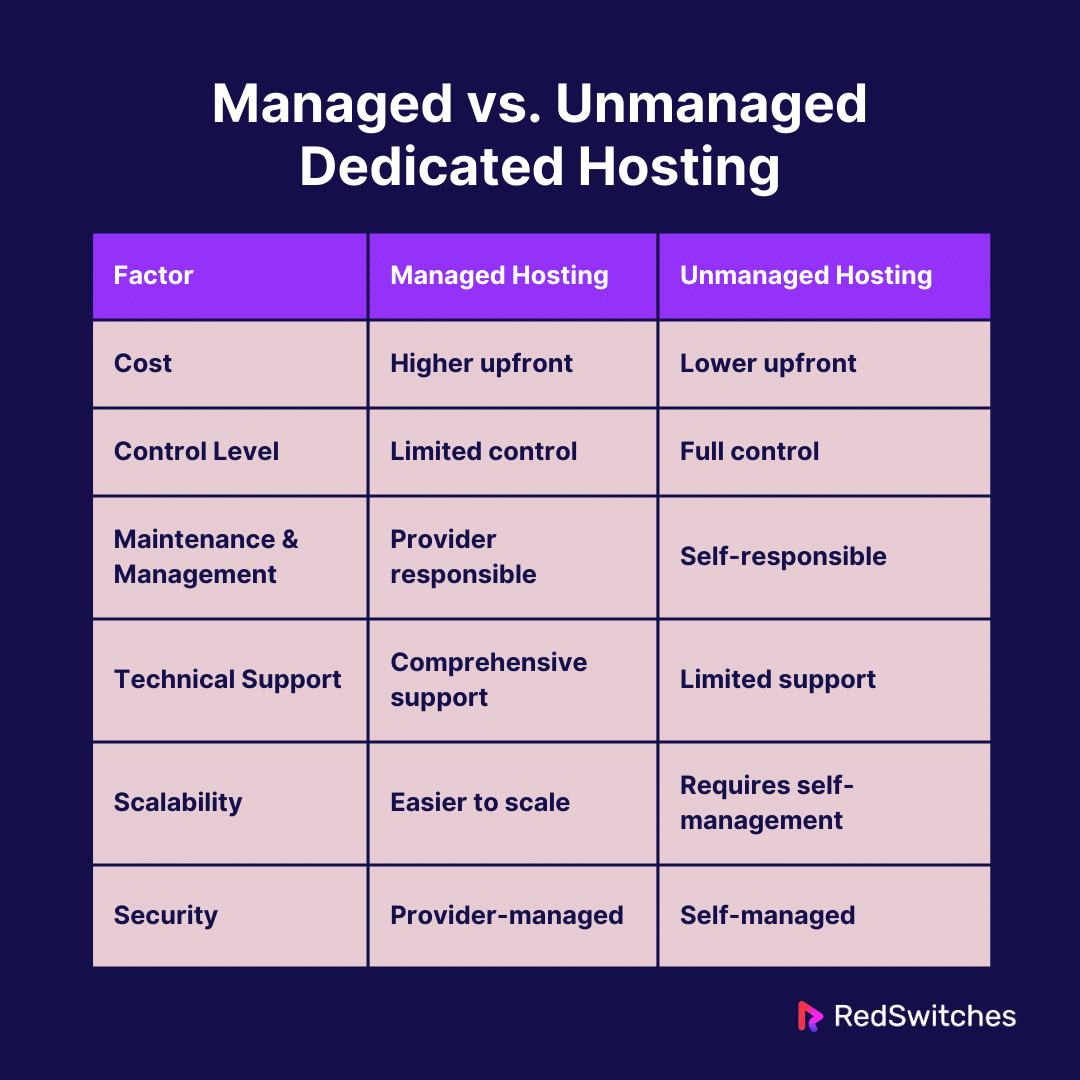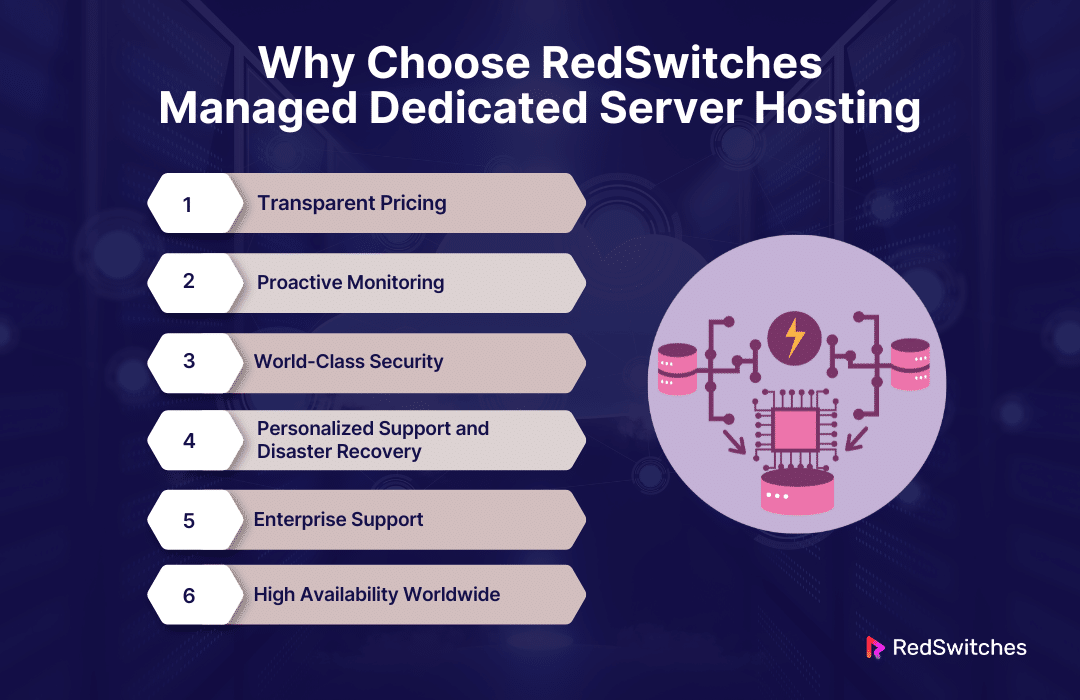Key Takeaways
- Dedicated server management involves outsourcing server administration and maintenance to a specialized team.
- Server management is necessary for businesses of all sizes. This is especially true for those lacking in-house expertise or resources.
- Managed server hosting includes features like server setup, hardware and software management, and backup services.
- Benefits of managed servers include cost reduction, increased uptime, and peace of mind.
- Managing a server independently involves burdensome responsibilities. This includes setup, maintenance, backups, monitoring, and technical support.
- The choice between managed and unmanaged hosting depends on several factors, including expertise, resources, and the desired level of control.
- RedSwitches offers managed server hosting with extensive features and expert support.
Did you know that the server market is expected to reach a value of US$11 by 2028? As an increasing number of businesses opt for dedicated hosted servers, it is more important than ever to understand the basics of server management for dedicated servers.
This blog will discuss the basics of dedicated server management, from key features to the benefits. It will also offer tips on avoiding the headaches of server management and compare managed and unmanaged dedicated hosting.
Let’s begin!
Table Of Contents
- Key Takeaways
- What is Dedicated Server Management?
- Who Needs Server Management?
- How Does Server Management Work?
- Key Features of Managed Dedicated Servers
- Server Management Benefits
- How to Avoid the Headaches of Managing a Dedicated Server
- Things You Have to Manage on Your Own
- Managed vs. Unmanaged Dedicated Hosting
- Questions to Guide Your Choice
- Why Choose RedSwitches Managed Dedicated Server Hosting
- Conclusion
- FAQs
What is Dedicated Server Management?
Credits: FreePik
Dedicated server management is the process of managing and maintaining a server to ensure optimal performance, reliability, and security. This type of management involves various tasks, including:
- Installing and updating software.
- Monitoring network and hardware performance.
This ensures data security through regular backups, implementing robust security measures, and troubleshooting issues.
A dedicated hosted server is used by only one client. It gives the client total control over its resources. These servers require technical skills to set up, manage, and protect against attacks. Effective server maintenance keeps the server in excellent condition. It offers constant performance for websites and apps and reduces downtime. This supports the company’s online presence and activities.
Dedicated hosted server customer support is an often overlooked but incredibly important factor for business success. Read our blog, ‘Importance Of Dedicated Server Customer Support For Hosting,’ to understand why.
Who Needs Server Management?
As IT environments become increasingly complex and the demand for reliability increases, the question arises: who needs server management? Find the answer below:
Businesses of All Sizes
There is a common misconception that only large businesses require server management. However, this is not true. Server management can benefit businesses of all sizes.
Small Businesses
Small firms with minimal IT resources usually struggle to manage servers. Effective server administration enables companies to keep their online operations running effectively. It protects their digital presence and data integrity.
Medium-Sized Enterprises
Server management is necessary for medium-sized firms to handle increased online activity and more complex IT needs. Proper management ensures these businesses can scale operations while maintaining performance and security.
Large Corporations
Large corporations depend highly on server management for their extensive IT infrastructure. They need regular monitoring and management to avoid downtime and data breaches and ensure all systems operate efficiently across locations.
IT and Web Hosting Companies
IT service providers and web hosting companies are dependent on server management. They host and manage websites, applications, and servers for many clients. This makes it imperative to ensure uptime, performance, and security. These companies also need dedicated hosted server management to fulfill their service level agreements.
E-commerce Platforms
E-commerce businesses are heavily reliant on online transactions. This is why they require servers that are always available and responsive. Managing servers for these platforms means ensuring they can handle increased loads swiftly while maintaining high speed.
This makes it important for them to employ advanced security protocols. Such protocols help protect customer data and financial information. This dual focus on performance and security is essential for the smooth operation of e-commerce sites.
Large Enterprises and Corporations
Large enterprises often run vast networks of servers. These support their complex business activities and data management. These organizations require server management. This ensures their IT infrastructure reliably supports their operations. It also ensures the infrastructure’s ability to scale as the business expands.
SaaS Providers
SaaS companies that distribute applications online need servers to host their software solutions. Effective server administration ensures high availability, dependability, and performance of their services for end customers.
Healthcare and Financial Institutions
Healthcare and finance organizations with regulatory compliance-related responsibilities require stringent server management. These institutions must maintain the highest data security, uptime, and performance levels to protect patient and client data and avoid penalties for non-compliance.
Educational Institutions and Government Agencies
Server management is crucial for educational institutions and government entities. These organizations use digital platforms to provide and manage services. It is essential to keep their online resources available and secure. This ensures they can perform their educational and civic duties effectively.
How Does Server Management Work?
Credits: FreePik
To understand how server management works, it is important to go over the key components of server management:
Key Components of Server Management
The key components of server management include:
Hardware Monitoring and Maintenance
Hardware monitoring and server specs maintenance include:
- Conducting frequent physical inspections to identify signs of wear or possible failure.
- Monitoring CPU, memory, and storage to prevent overloading.
- Regulating environmental controls to maintain appropriate temperature and humidity levels.
These methods protect the server’s physical health, reducing hardware deterioration and increasing longevity.
Software Updates and Patch Management
Keeping software up-to-date is crucial in server management. This includes:
- Regularly updating the operating system to fix bugs and enhance security.
- Managing application installations and configurations to meet business needs.
- Applying security patches to mitigate vulnerabilities.
These activities maintain the server’s software integrity and protect it against cyber threats.
Network Management and Security
Network management and security include:
- Tracking network traffic for abnormalities.
- Establishing firewalls to restrict unwanted access while permitting legal traffic.
- Installing intrusion prevention and detection systems.
These safety features are critical for keeping the server’s network secure and efficient and preventing illegal access and other network problems.
Backup and Disaster Recovery
Regular data backups and robust disaster recovery planning are critical for mitigating the risk of data loss and ensuring quick service restoration after an outage. This involves backing up data to secure locations and developing tested disaster recovery plans, essential for business continuity in the face of hardware failures or cyber incidents.
Performance Optimization
Performance optimization includes adjusting server resources to meet demand and implementing load balancing to distribute traffic across multiple servers. This ensures optimal performance, prevents over-provisioning of resources, and avoids single points of failure, leading to a more reliable and efficient server environment.
Server Management Process
Here’s a detailed look at how the server management process unfolds:
Assessment
The first step in server management involves assessing the existing server infrastructure. This includes evaluating the physical and virtual server environments and understanding the workload capacities. You must also identify the performance benchmarks and detect potential issues or vulnerabilities.
This phase aims to understand the servers’ current state, informing the next steps in the management process.
Implementation
The next step is implementing necessary changes or improvements based on the assessment findings. This might involve:
- Upgrading hardware components to boost performance.
- Installing new software applications to enhance functionality.
- Configuring server settings to optimize operations.
Besides this, implementation can also include:
- Setting up new servers.
- Migrating data and services.
- Integrating additional tools and services to support server management tasks.
Monitoring
Continuous monitoring is vital in server management. This step involves using tools and technologies to track servers’ performance, availability, and health in real-time. Monitoring covers various aspects. This includes:
- Resource usage (CPU, memory, disk space).
- Network activity.
- Application performance.
- Security threats.
The objective is to identify anomalies or issues impacting server performance or uptime and address them.
Maintenance
Regular maintenance is crucial to ensure servers continue to operate smoothly and efficiently. Maintenance activities include:
- Applying software updates and patches to protect against vulnerabilities.
- Conducting hardware checks and replacements.
- Optimizing configurations.
- Performing routine cleanups of system files and databases.
Scheduled maintenance helps prevent unexpected failures and downtime by updating the server environment.
Backup and Disaster Recovery
Server management requires regular backing up of data and solid disaster recovery plans. This step ensures that critical data is copied and stored securely in separate locations. It helps protect from data loss due to hardware failures, cyber-attacks, or natural disasters.
Disaster recovery planning involves establishing protocols and procedures to restore services and data quickly after an incident. This minimizes downtime and operational impact.
Review and Optimization
The final step in the server management process is the ongoing review and optimization of the server infrastructure. This involves analyzing performance data, monitoring trends, and gathering feedback to identify areas for improvement.
The insights gained from this review process are used to make informed decisions about future upgrades, scaling, or adjustments needed to boost server performance, reliance, and capacity.
Also Read: Service Level Agreement In Dedicated Hosted Server Agreements.
Key Features of Managed Dedicated Servers
Here are the key features of managed servers:
Management + Support
Credits: FreePik
One noteworthy benefit of managed servers is the hosting provider’s extensive administration and assistance. This involves monitoring server performance around the clock, updating software on schedule, applying security patches, and resolving technical problems.
Customers gain from the experience of seasoned IT specialists who ensure the server runs well, freeing enterprises to concentrate on their primary business operations rather than worrying about technical server issues.
Improved Security Measures
Managed servers have advanced security protocols to protect private data and prevent unauthorized access. These include firewalls, security software, and regular security audits. The hosting provider also implements strong measures to keep malware, DDoS attacks, and other cyber threats at bay, ensuring a secure environment for the client’s websites and applications.
Customization + Scalability
Managed servers offer considerable customization. They allow clients to configure their servers based on specific requirements. This includes selecting the operating system, hardware specifications, and the applications to be installed. These servers provide:
- Scalability options.
- Enabling businesses to upgrade their resources as their needs grow easily.
- Ensuring they can handle increased traffic and data load without compromising performance.
High Performance + Reliability
Dedicated hosted servers offer one client sole access to the server’s resources, which produces excellent reliability and performance. These servers can effectively manage high traffic volumes and intricate applications since they have specialized memory, storage, and computing capacity.
Higher uptime is guaranteed with managed dedicated hosting, ensuring that users can always access websites and apps.
Consistent Backups + Disaster Recovery
Data protection is a critical aspect of managed servers. Hosting providers typically offer regular backup services, ensuring client data is safely stored and quickly restored in case of data loss or server failure.
Comprehensive disaster recovery plans are also in place to lower downtime and ensure business continuity during unexpected incidents.
Custom Solutions + Expertise
Managed server companies frequently give personalized solutions to enterprises’ demands. These may offer specific hosting setups, performance optimization, and dedicated support channels.
A key advantage is access to a team of IT specialists trained in server administration and best practices. It offers organizations the insights and direction to improve their server infrastructure.
Also Read: A 2024 Guide To Effective IP Address Management In Hosting.
Server Management Benefits
Here are a few benefits of managed servers for businesses:
Reduced Cost
Credits: FreePik
Meticulous server administration offers considerable cost savings. Effective management aids in recognizing and addressing possible problems before they become costly repairs or replacements. Businesses may save money by doing routine maintenance and monitoring on their servers.
Managed server services frequently follow a predictable payment plan. This helps organizations to budget more efficiently and prevent unexpected costs. This financial certainty and reduced requirement for in-house server administration personnel can save significant costs over time.
Increased Uptime
Uptime, which measures system dependability and availability, is critical for every online organization. Server management is crucial for maximizing uptime by continuously monitoring and responding quickly to any issues that develop.
Regular updates and maintenance guarantee that the server runs smoothly. They help avoid downtime due to software malfunctions or hardware faults. Managed server services frequently include redundant systems and backup solutions. This lowers the chance of lengthy downtime and ensures that organizations function around the clock.
Peace of Mind
Effective server administration assures organizations that their server operations are in competent hands. This confidence is essential for businesses without considerable IT experience or resources.
Managed server providers monitor, maintain, and protect servers. This empowers company owners to focus on other tasks without stressing about server difficulties. This support eases companies from the burden of maintaining complicated IT infrastructure. Companies also enjoy the peace of mind of having expert aid available in an emergency.
Experienced Server Experts
Another advantage of managed server services is access to knowledgeable server professionals. These individuals have the skills and expertise to effectively manage server infrastructure, resolve complicated technological challenges, and apply cutting-edge security measures to safeguard against cyber attacks. Their experience ensures that the server is optimized for speed, security, and dependability.
Server professionals also keep up with the newest technical breakthroughs and may advise firms on strategic IT decisions. This allows them to use technology to achieve their objectives.
Also Read: 5 Best CPanel Alternatives (& Cheaper).
How to Avoid the Headaches of Managing a Dedicated Server
Sometimes, managing a server independently is not a task for the faint-hearted. This is especially true if you are a business without dedicated IT units. However, with the right strategies and knowledge, you can minimize the complexities and avoid the common headaches associated with server management.
Here are a few expert tips to avoid the headaches of managing a server:
Understanding Your Requirements
Before entering the server management space, clearly define your business requirements. This involves assessing your website’s traffic and determining your storage needs and application requirements. This understanding will show you how to select the correct server specifications. Why should you do this? Following this tip will allow you to prevent performance issues and avoid overpaying for unnecessary resources.
Picking the Right Hosting Provider
Picking a hosting provider without much research can result in major issues. This is why you must select a hosting provider carefully. Ensure the provider you pick offers reliable support and robust infrastructure. Look for providers with a strong track record. You can depend on reviews from credible sources for information on this matter.
Priorirtize 24/7 customer support. A good provider will offer various services, including managed hosting options, which can relieve a significant burden.
Opt for Managed Services
If you lack the time or technical expertise to manage a server, consider using managed hosting services. Although managed services may incur extra costs, they include regular updates, security monitoring, backup services, and technical support. These features can be a godsend for businesses. They can minimize the workload on your internal team and ensure professional handling of your server’s maintenance.
Implement Automation Tools
Use automation tools for routine tasks such as updates, backups, and monitoring. Automation can seriously reduce the chances of human error and free up your team to focus on more strategic tasks. Many control panels and management tools offer automation features that can simplify server administration.
Stay on Top of Security
Credits: FreePik
Security is a necessity in server management. Ensure advanced security measures like firewalls are in place to help detect and prevent any security threats promptly. Your software must always be up-to-date with the latest security patches and updates. Educating your team on security best practices can also mitigate risks.
Regular Backups
Prioritize a robust backup strategy. Regular backups can prevent destructive data loss due to hardware failure or cyber-attacks. Store backups in multiple locations. Ideally, you should have them both on-site and off-site. This helps defend against various forms of data loss.
Monitor Performance Regularly
Monitoring your server’s performance is vital to proactively recognizing and addressing issues. Use monitoring tools to track server health, resource usage, and traffic patterns. This will help you stay on top of potential issues and address them in the beginning stages. This proactive approach can help you prevent downtime and maintain optimal performance.
Train Your Team
Invest in training for your team to manage the server effectively. A well-trained team can be your secret to smooth sailing operations. Knowledgeable staff can quickly identify and resolve issues. They offer you peace of mind that your business will not have to go through downtime. A well-trained and motivated team can also help constantly boost the efficiency of your operations.
Plan for Scalability
Your server’s requirements may change as time passes and your business experiences growth. Plan for future growth by choosing scalable server solutions. As your provider of servers that can accommodate increased traffic and storage needs without substantial downtime or migrations.
Things You Have to Manage on Your Own
When you manage your server in-house, you gain control and take on the workload and challenges. This makes it important to understand the aspects you will manage on your own to ensure smooth operation. Here are the critical aspects you need to manage on your own:
Server Setup
Credits: FreePik
The first stage in managing your server is the setup process. This involves several steps, including:
Installing the Operating System
- Selection
Depending on your demands and expertise, choose an operating system (OS) that suits your server’s purpose. You can opt for Windows Server or Linux distributions like Ubuntu or CentOS.
- Installation
Install the OS on the server hardware. This may involve setting up from a bootable USB drive, CD/DVD, or via network booting.
- Configuration
Configure basic settings like language, time zone, and disk partitions during installation according to the server’s intended use.
Configuring Network Settings
- IP Address Configuration
Depending on your network setup, assign the server a static IP address for consistent network access or configure it to obtain an IP dynamically via DHCP.
- DNS Settings
Define the Domain Name System (DNS) settings to ensure the server can accurately resolve domain names to IP addresses.
- Firewall Rules
Set up firewall rules to control incoming and outgoing network traffic. This protects the server from unauthorized access while allowing necessary network communications.
Setting Up User Accounts
- Administrator Account
Create an administrator or root account with full control over the server. Use strong, unique passwords. For added security, consider two-factor authentication.
- User Accounts
Create additional user accounts with appropriate permissions based on their roles. For instance, a web developer might need different access rights than a content manager.
- Access Control
Implement least privilege principles. This ensures users have only the access necessary to perform their tasks. It lowers the risk of security breaches.
Ensuring the Server is Ready for Its Intended Use
- Software Installation
Install and configure the necessary software applications specific to the server’s role. This includes web server software (Apache, Nginx), database management systems (MySQL, PostgreSQL), or email servers.
- Security Measures
Implement additional security measures. This includes antivirus software, intrusion detection systems, and periodic security audits to protect against threats.
- Performance Testing
Conduct performance tests to ensure the server can handle the expected load. Monitor resource usage and adjust configurations as needed to optimize performance.
- Backup and Recovery
Set up backup solutions to safeguard data. Ensure a recovery plan for dealing with data loss or server failure scenarios.
Proper server setup is crucial as it is the server’s performance and security foundation. You will likely face major issues if you make any mistakes during this initial setup process. This makes it critical to seek assistance from experts. You’ll also need to configure the server according to best practices to ensure it can handle the required tasks efficiently.
Also Read: Enhance Security With Firewall Configuration In 2024.
Hardware and Software Management
Now, onto step two. Managing your server’s hardware and software is a continuous responsibility. Hardware management involves monitoring the physical components of the server. This includes hard drives, memory, and processors to ensure they function correctly and replace faulty parts.
Software management entails installing, updating, and maintaining all the software applications running on the server. Keeping software up to date is vital for security and performance. You must also ensure compatibility between various software components and the server’s operating system.
Backup Services
Implementing a reliable backup strategy is important when managing your server. You must regularly back up all vital data to prevent loss in case of hardware failure or cyberattacks.
Effective backup services involve scheduling regular backups, verifying their success, and ensuring backup copies are kept securely. It is also advisable to test your backup system occasionally to ensure that data can be restored correctly.
System Monitoring
Credits: FreePik
Continuous monitoring of your server’s system is necessary to detect and address issues promptly. This includes tracking the server’s performance, resource usage, and network traffic to identify potential problems before they escalate. Monitoring tools can alert you to unusual activity, such as security breaches or hardware failures, allowing you to take immediate action to mitigate risks and maintain server uptime.
When managing your server, you also take on the role of technical support. This means you are responsible for diagnosing and resolving any issues that arise. Effective technical support requires a solid understanding of the server’s architecture and the ability to troubleshoot various problems, from simple configuration issues to complex hardware or software failures.
Also Read: An Online Mock Test Portal Receives A Cost-effective And Efficient Server.
Managed vs. Unmanaged Dedicated Hosting
Carefully choosing between managed and unmanaged server hosting is essential for your business’s success. This choice impacts various factors, including cost, control, maintenance, and technical support. Here’s a detailed comparison to help you decide which option best fits your needs:
Cost
Here is a comparison of managed vs unmanaged dedicated hosting in terms of cost:
Managed Hosting
Managed hosting is more costly due to the added services offered by the hosting provider. These services include server setup, monitoring, security, maintenance, and support. The higher cost pays for the convenience of having experts manage the server, which can benefit businesses without in-house IT personnel.
Unmanaged Hosting
Unmanaged hosting is less heavy on the pocket as it includes only the server and network connection. The business is responsible for all server management tasks. This lower costs but increases the internal workload. This option is cost-effective for startups with minimal budgets. It is also a great choice for businesses with the technical expertise to manage a server in-house.
Control Level
Here is a comparison of managed vs unmanaged dedicated hosting in terms of control level:
Managed Hosting
The service provider controls the server environment in managed hosting. Although this ensures professional management, it can limit the business’s ability to implement custom configurations. Managed hosting is perfect for businesses focusing on their core activities instead of server management.
Unmanaged Hosting
Unmanaged hosting offers 100% control over the server. It enables businesses to configure and manage it according to their specific needs. Having complete control is perfect for businesses with specific performance, security, or software requirements that necessitate custom configurations.
Maintenance + Management
Here is a comparison of managed vs unmanaged dedicated hosting in terms of maintenance and management:
Managed Hosting
The hosting provider handles all maintenance tasks in managed hosting. This includes software updates, security patches, and hardware issues. This comprehensive support ensures the server remains operational, secure, and up-to-date without demanding direct business involvement. It empowers businesses to focus on other important aspects of their business.
Unmanaged Hosting
The business is in charge of all maintenance and management tasks in unmanaged hosting. This includes everything from installing software and applying updates to monitoring security and troubleshooting issues. Although this offers more flexibility, it requires a lot of time and technical expertise.
Technical Support
Here is a comparison of managed vs unmanaged dedicated hosting in terms of technical support:
Managed Hosting
Managed services stand out for providing extensive technical support. Clients receive 24/7 access to a team of experts who can manage the server. This team does much more than management. They troubleshoot issues and perform necessary updates and maintenance. This support is invaluable for businesses without a large IT team, as it ensures quick resolution of technical problems.
Unmanaged Hosting
Unmanaged hosting offers minimal support. The support is usually limited to hardware issues or network connectivity. The business is responsible for all other aspects. This includes software, security, and other technical issues. These aspects require a higher level of IT expertise in-house to manage and maintain the server.
Scalability
Credits: FreePik
Here is a comparison of managed vs unmanaged dedicated hosting in terms of scalability:
Managed Hosting
Managed servers often come with scalable options that can be easily adjusted to accommodate the changing business needs. Thanks to their managed infrastructure, hosting providers can quickly allocate additional resources, like more storage or bandwidth, without experiencing downtime.
Unmanaged Hosting
While unmanaged servers can also be scalable, the process usually requires more effort from the client. Businesses need to plan and execute upgrades, which can be time-consuming and require technical knowledge. It can also result in extended downtime, which can frustrate customers.
Security
Here is a comparison of managed vs unmanaged dedicated hosting in terms of security:
Managed Hosting
Security in managed hosting is a shared responsibility. The provider ensures the physical server and network are secure. They also conduct periodic security audits and implement necessary patches and updates. This can offer peace of mind to businesses that may not have the expertise to handle complex security threats.
Unmanaged Hosting
In an unmanaged hosting setting, the business is entirely responsible for securing the server. So, if you choose unmanaged hosting, you install firewalls, run security audits, and update software. Sounds hectic, right?
It is also important to remember that while this allows for tailored security measures, it requires significant time and resources to maintain strong defenses against cyber threats.
Also Read: Dedicated Hosting Provider Selection Process In 2024.
Questions to Guide Your Choice
Consider the following questions further to refine your decision between managed and unmanaged dedicated hosting:
- What is the IT expertise level within my business?
Evaluate whether your team has the skills and resources to manage a server effectively.
- How much control do I need over my server environment?
Determine if you require complete control for custom applications or if you can operate within the managed environment.
- What are my budget constraints?
Consider both the immediate and long-term financial implications of managed vs. unmanaged hosting.
- How critical is uptime for my business?
Assess the importance of having a reliable support team to maintain high availability.
- What are my security and compliance needs?
Decide if you can manage security in-house or if you need expert assistance.
- How quickly do I anticipate needing to scale my resources?
Plan for future growth and consider which hosting option best accommodates your scaling needs.
- What are my business continuity and disaster recovery requirements?
Reflect on your need for robust disaster recovery plans. Evaluate whether you can manage them internally or need external support.
- How do I prefer to handle software updates and patch management?
Decide if you can manage regular software updates and security patches yourself. Consider if you would benefit from a managed service handling these tasks.
- What is the expected growth trajectory of my business?
Determine how your hosting needs may evolve. Consider whether a managed or unmanaged service offers the flexibility to adapt to changing demands.
- Do I have the resources to handle server-related issues 24/7?
Evaluate your ability to respond to server issues at any time. Consider whether having managed support would mitigate operational risks.
- How important is dedicated technical support to my operations?
Assess the value of having dedicated technical support to address potential issues swiftly and efficiently.
- Am I prepared to invest in the necessary tools and systems for server management?
Evaluate the investment in management tools and systems required for unmanaged hosting. Consider whether this fits your budget and capabilities.
Why Choose RedSwitches Managed Dedicated Server Hosting
RedSwitches managed servers stand out in the hosting market for several reasons. They offer transparent pricing, proactive monitoring, world-class security, and more. Here, we further investigate these factors to understand. Let’s discuss why RedSwitches is the best for your managed server needs:
Transparent Pricing
RedSwitches offers transparent pricing for its managed dedicated server solutions. This clarity ensures businesses can budget effectively without worrying about hidden costs charges. Clients can select the service package that best meets their needs and budget. All costs are clearly outlined. This transparency builds trust and allows for better financial planning.
Proactive Monitoring
RedSwitches ensures you don’t lose sleep over hardware or software issues. The company follows a proactive monitoring approach. The support team continuously oversees server performance and health. They quickly identify and resolve any issues before the client notices them.
This level of attentiveness ensures maximum uptime and optimal server performance. It enables businesses to focus on their core activities rather than managing server infrastructure.
World-Class Security
Security takes center stage at RedSwitches. Clients benefit from virus scans, real-time system monitoring, and anti-DDoS protection – standard in managed plans. This proactive security approach ensures that servers are safeguarded against various threats. It helps maintain the integrity and availability of business data and services. This way, clients can focus on business growth while knowing security measures protect their servers.
Personalized Support and Disaster Recovery
RedSwitches provides personalized support alongside robust disaster recovery services. Regular system backups ensure that all data can be quickly restored if disaster strikes. This commitment to data protection provides peace of mind to businesses. They can rest assured that they are prepared for any event. Their important data remains secure and recoverable.
Enterprise Support
RedSwitches offers 24/7 real human support. This ensures clients have access to experienced engineers around the clock. Whether mid-afternoon in Sydney or early in Santa Cruz, the support team can answer questions and resolve issues. This enterprise support is a godsend for businesses operating in a global market. Access to timely expert assistance can make a significant difference in this space.
High Availability Worldwide
RedSwitches boasts world-class data centers in strategic locations. These include:
- Europe.
- America.
- Asia.
- Switzerland.
- India.
- Australia.
The provider’s global presence guarantees high availability and steady performance for clients’ demanding apps, regardless of location. Businesses using RedSwitches enjoy speedy and dependable server performance, improving the global customer experience.
Conclusion
Understanding the basics of dedicated server management is important for leveraging the full potential of your online infrastructure. When managed effectively, an affordable dedicated server can offer unparalleled control. It also offers benefits like performance and security, laying a solid foundation for your business’s digital success.
RedSwitches stands out as a reliable managed server hosting provider. We offer the best dedicated server solutions in the market and have a reputation for offering robust, scalable, and secure hosting options.
Partnering with us grants you access to expert support and cutting-edge technology. So what are you waiting for? Learn how RedSwitches can upgrade your server management game. Visit our dedicated server page today and take the first step towards a more reliable, efficient, and secure digital future.
FAQs
Q. What is a dedicated server?
A dedicated hosted server is a physical server rented to or bought by a business. A dedicated hosted server improves performance security and controls the server’s settings completely.
Q. What is a fully managed dedicated server?
A fully managed server is a hosting solution where the service provider takes responsibility for all server management aspects. This includes setup, monitoring, maintenance, security, and support. Clients don’t need to handle technical details. The provider ensures the server’s optimal performance and security.
Q. What are the benefits of managed dedicated servers?
Managed servers offer hassle-free server management, including 24/7 monitoring, technical support, and maintenance. They also provide peace of mind by ensuring server security and consistent performance.
Q. What is server management?
Server management involves tasks related to maintaining and optimizing a server. This ensures its availability, security, and performance. It may include server configuration, monitoring, server support, and management options based on your requirements.
Q. How is dedicated server hosting different from other types of hosting?
Dedicated hosting exclusively uses a physical server for a single client. The client enjoys full control over the server and its resources. This contrasts with shared hosting or VPS hosting, where resources are shared among multiple users.
Q. What are some common server management options available?
Common server management options include managed dedicated services, cPanel control panel for easy administration and root access for full control, and reboot capabilities to restart the entire server. You can choose these options based on your needs and expertise.
Q. Which operating system is commonly used for dedicated server setups?
Linux distributions, including CentOS and Windows Server, are commonly used operating systems for dedicated hosted server setups. Your choice of operating system may depend on the applications you plan to run on the server and on your familiarity with the OS.
Q. What is dedicated hosting?
Dedicated hosting refers to a hosting service where an entire server is allocated to a single client or website. This means the client fully controls the server’s resources and configuration.
Q. How do you choose the right operating system for dedicated hosting?
When selecting an operating system for dedicated hosting, you must consider several factors. This includes Linux or Windows Server compatibility, management options, and server support.
Q. How important is server monitoring for dedicated server hosting?
Server monitoring is crucial for dedicated hosting as it enables timely issue detection. It also helps spot performance bottlenecks and security threats. Monitoring tools help ensure optimal server performance and uptime.
Q. What are the key considerations when choosing a hosting provider for a dedicated server?
When selecting a hosting provider for your server, you must consider factors like managed dedicated services and data center location. The server management plan and access to server support are also key considerations.
Q. What is the significance of root access in dedicated management?
Root access provides full administrative control over the server’s settings and configuration. It enables users to make system-level changes and install additional software on their dedicated hosted server.
Q. Can you explain the difference between a dedicated server and a VPS?
A dedicated hosted server is a physical server entirely dedicated to one client. It offers maximum resources and performance. VPS (Virtual Private Server) is a virtualized server environment created within a larger physical server shared by multiple users.
